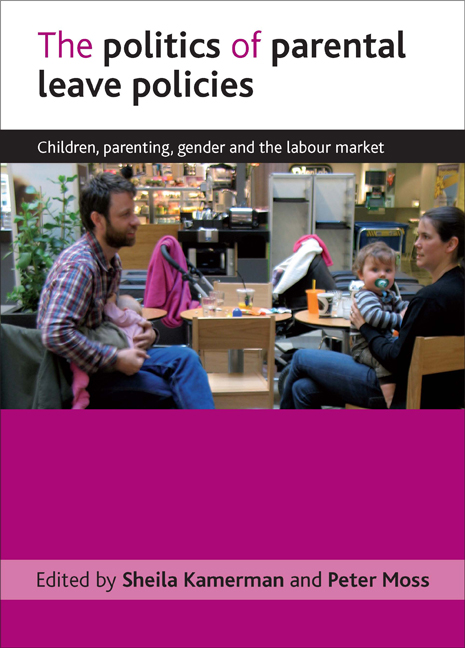Book contents
- Frontmatter
- Contents
- List of tables and figures
- Acknowledgements
- Notes on contributors
- one Introduction
- two Australia: the difficult birth of paid maternity leave
- three Canada and Québec: two policies, one country
- four Czech Republic: normative or choice-oriented system?
- five Estonia: halfway from the Soviet Union to the Nordic countries
- six Finland: negotiating tripartite compromises
- seven France: gender equality a pipe dream?
- eight Germany: taking a Nordic turn?
- nine Hungary and Slovenia: long leave or short?
- ten Iceland: from reluctance to fast-track engineering
- eleven The Netherlands: bridging labour and care
- twelve Norway: the making of the father’s quota
- thirteen Portugal and Spain: two pathways in Southern Europe
- fourteen Sweden: individualisation or free choice in parental leave?
- fifteen The European directive: making supra-national parental leave policy
- sixteen Conclusion
- Appendix
- Index
thirteen - Portugal and Spain: two pathways in Southern Europe
Published online by Cambridge University Press: 05 July 2022
- Frontmatter
- Contents
- List of tables and figures
- Acknowledgements
- Notes on contributors
- one Introduction
- two Australia: the difficult birth of paid maternity leave
- three Canada and Québec: two policies, one country
- four Czech Republic: normative or choice-oriented system?
- five Estonia: halfway from the Soviet Union to the Nordic countries
- six Finland: negotiating tripartite compromises
- seven France: gender equality a pipe dream?
- eight Germany: taking a Nordic turn?
- nine Hungary and Slovenia: long leave or short?
- ten Iceland: from reluctance to fast-track engineering
- eleven The Netherlands: bridging labour and care
- twelve Norway: the making of the father’s quota
- thirteen Portugal and Spain: two pathways in Southern Europe
- fourteen Sweden: individualisation or free choice in parental leave?
- fifteen The European directive: making supra-national parental leave policy
- sixteen Conclusion
- Appendix
- Index
Summary
Portugal
Maternity leave: 120 calendar days (17 weeks) at 100% of earnings or 150 days at 80%, with no ceiling. Mothers have to take 6 weeks after the birth of a child; the rest may be transferred to the father.
Paternity leave: 5 working days at 100% with no ceiling; obligatory.
Parental leave: 3 months per parent until child is 6 years. No payment except for 15 calendar days at 100% with no ceiling if taken by the father immediately after maternity or paternity leave.
Leave to care for children: 30 days a year per family for sick children under 10 years at 65% of average earnings; no time limit if a child is in hospital.
Other: 2 hours’ absence per working day per family for 12 months after a child's birth, without loss of earnings (paid by employer).
Spain
Maternity leave: 16 weeks at 100% up to a ceiling of €3.074 per month. Mothers can transfer up to 10 weeks to fathers or choose to take them part time over 20 weeks.
Paternity leave: 15 calendar days, 2 days to be taken after birth, the rest during/at the end of maternity leave, at 100%. May be taken part time with employer's agreement.
Parental leave: until child is 3 years; an individual entitlement. No payment, but some regional governments offer low flat-rate benefits.
Leave to care for dependants: 2 days per worker for a ‘seriously ill’ child or other family reasons, without loss of earnings (paid by employer).
Other: one hour's absence per working day per family for 9 months after a child's birth (paid by employer). Reduced hours may be consolidated to allow a 2–4 week extension of maternity leave. Working parents may reduce their working hours (from one eighth to half of working time) until a child is 8 years, without payment; some regional governments offer benefits for the working time reduction.
Portugal and Spain are member states of the European Union (EU). Portugal has a high level of maternal employment and a low level of female part-time employment. It is estimated that about three quarters of mothers are eligible for maternity leave. Although obligatory, in 2006 only 61% of fathers took paternity leave and 49% the 15 days of paid parental leave (however, take-up is underestimated as statistics exclude employees with special social protection regimes, for example, in the civil service and banks).
- Type
- Chapter
- Information
- The Politics of Parental Leave PoliciesChildren, Parenting, Gender and the Labour Market, pp. 207 - 226Publisher: Bristol University PressPrint publication year: 2009
- 4
- Cited by



